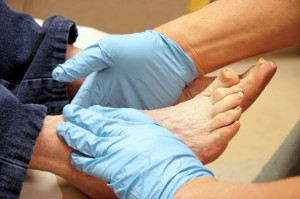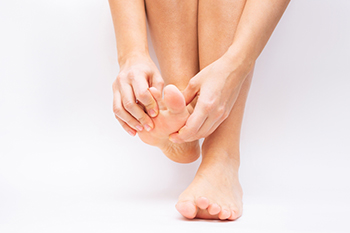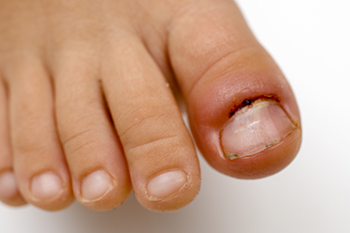Items filtered by date: September 2023
Treatment Options for Diabetic Nerve Pain

Living with diabetes presents a unique set of challenges, one of which is diabetic nerve pain, also called diabetic neuropathy. This condition can lead to sensations of tingling, numbness, and discomfort in the lower extremities, especially your feet. Medication prescribed by a podiatrist, including anticonvulsants, antidepressants, and pain relievers, can provide relief from diabetic nerve pain. Additionally, making lifestyle adjustments, such as maintaining stable blood sugar levels through dietary modifications and regular exercise, can help to reduce nerve pain. In some cases, nerve blocks may be recommended, temporarily numbing affected nerves to alleviate pain. Topical treatments, such as creams, gels, or patches containing capsaicin or lidocaine, can also be helpful in targeting localized discomfort. It's important for diabetics to practice routine foot care, including vigilant inspection for injuries, to prevent serious complications. Certain exercises to improve muscle strength and balance may also reduce the risk of both falls and further nerve damage. Early intervention and consistent monitoring are paramount for effectively managing this problem. If you are experiencing diabetic nerve pain, it is suggested that you make a podiatrist a regular member of your healthcare team.
Diabetic foot care is important in preventing foot ailments such as ulcers. If you are suffering from diabetes or have any other concerns about your feet, contact one of our podiatrists from Houston Foot and Ankle Care. Our doctors can provide the care you need to keep you pain-free and on your feet.
Diabetic Foot Care
Diabetes affects millions of people every year. The condition can damage blood vessels in many parts of the body, especially the feet. Because of this, taking care of your feet is essential if you have diabetes, and having a podiatrist help monitor your foot health is highly recommended.
The Importance of Caring for Your Feet
- Routinely inspect your feet for bruises or sores.
- Wear socks that fit your feet comfortably.
- Wear comfortable shoes that provide adequate support.
Patients with diabetes should have their doctor monitor their blood levels, as blood sugar levels play such a huge role in diabetic care. Monitoring these levels on a regular basis is highly advised.
It is always best to inform your healthcare professional of any concerns you may have regarding your feet, especially for diabetic patients. Early treatment and routine foot examinations are keys to maintaining proper health, especially because severe complications can arise if proper treatment is not applied.
If you have any questions please feel free to contact our offices located in Inner Loop, Southwest, Greater Heights, and Pearland, TX . We offer the newest diagnostic and treatment technologies for all your foot and ankle needs.
Reminder: When Was the Last Time...?
Causes of Numbness in the Toes

Numbness in the toes is often a symptom of an underlying issue, rather than a condition itself. Several factors can contribute to this sensation. One common cause is poor circulation. Reduced blood flow to the toes can result from serious conditions like peripheral artery disease, or PAD, or more easily correctable habits, such as wearing tight footwear that restricts blood flow. Another potential cause of numbness in the toes is nerve compression, such as that caused by Morton's neuroma or nerve entrapment in the lower back. Diabetes, with its potential for nerve damage, termed neuropathy, is also a frequent cause of toe numbness. Infections and injuries, like frostbite or ingrown toenails, may temporarily disrupt nerve signals. In addition to these causes, nutritional deficiencies, particularly in vitamin B12, can lead to neuropathy and toe numbness. Lifestyle factors like smoking and excessive alcohol consumption can make these issues worse. To determine the cause of your toe numbness and receive appropriate treatment, it's suggested that you make an appointment with a podiatrist.
Neuropathy
Neuropathy can be a potentially serious condition, especially if it is left undiagnosed. If you have any concerns that you may be experiencing nerve loss in your feet, consult with one of our podiatrists from Houston Foot and Ankle Care. Our doctors will assess your condition and provide you with quality foot and ankle treatment for neuropathy.
What Is Neuropathy?
Neuropathy is a condition that leads to damage to the nerves in the body. Peripheral neuropathy, or neuropathy that affects your peripheral nervous system, usually occurs in the feet. Neuropathy can be triggered by a number of different causes. Such causes include diabetes, infections, cancers, disorders, and toxic substances.
Symptoms of Neuropathy Include:
- Numbness
- Sensation loss
- Prickling and tingling sensations
- Throbbing, freezing, burning pains
- Muscle weakness
Those with diabetes are at serious risk due to being unable to feel an ulcer on their feet. Diabetics usually also suffer from poor blood circulation. This can lead to the wound not healing, infections occurring, and the limb may have to be amputated.
Treatment
To treat neuropathy in the foot, podiatrists will first diagnose the cause of the neuropathy. Figuring out the underlying cause of the neuropathy will allow the podiatrist to prescribe the best treatment, whether it be caused by diabetes, toxic substance exposure, infection, etc. If the nerve has not died, then it’s possible that sensation may be able to return to the foot.
Pain medication may be issued for pain. Electrical nerve stimulation can be used to stimulate nerves. If the neuropathy is caused from pressure on the nerves, then surgery may be necessary.
If you have any questions, please feel free to contact our offices located in Inner Loop, Southwest, Greater Heights, and Pearland, TX . We offer the newest diagnostic and treatment technologies for all your foot care needs.
The Effects of Shoes on Biomechanics of the Feet

Understanding how your choice of footwear can affect your feet, legs, and joints is crucial. Ill-fitting or unsupportive shoes can exert pressure on these areas during physical activity, potentially resulting in discomfort and injuries. Inappropriate footwear choices may contribute to common sports injuries such as shin splints and Achilles tendon pain, as well as foot problems that can include corns, bunions, ingrown nails. These issues can severely limit or even halt your physical activity. Different activities require specific types of footwear, such as beach and road running. Wearing unsuitable shoes can worsen existing problems, such as hip, knee, ankle, or foot pain or arthritis. Even short periods of wearing in ill-fitting shoes can cause stress and pain in your bones, joints, and supporting soft tissues, especially if you stand for extended periods at a time. Your choice of shoes can significantly affect your walking style or gait. The correct step involves the heel making initial contact with the ground, followed by a slight inward roll of the arch. This can allow the ball of the foot and big toe to follow. The heel then lifts off the ground, enabling you to push off from the ball of your foot and big toe. Some individuals have arches that roll excessively inward or outward, both of which can impact how effectively your feet absorb shock. If you have questions about how the shoes you wear are affecting the biomechanics of your feet, it is suggested that you make an appointment with a podiatrist for a consultation.
If you have any concerns about your feet, contact one of our podiatrists from Houston Foot and Ankle Care. Our doctors can provide the care you need to keep you pain-free and on your feet.
Biomechanics in Podiatry
Podiatric biomechanics is a particular sector of specialty podiatry with licensed practitioners who are trained to diagnose and treat conditions affecting the foot, ankle and lower leg. Biomechanics deals with the forces that act against the body, causing an interference with the biological structures. It focuses on the movement of the ankle, the foot and the forces that interact with them.
A History of Biomechanics
- Biomechanics dates back to the BC era in Egypt where evidence of professional foot care has been recorded.
- In 1974, biomechanics gained a higher profile from the studies of Merton Root, who claimed that by changing or controlling the forces between the ankle and the foot, corrections or conditions could be implemented to gain strength and coordination in the area.
Modern technological improvements are based on past theories and therapeutic processes that provide a better understanding of podiatric concepts for biomechanics. Computers can provide accurate information about the forces and patterns of the feet and lower legs.
Understanding biomechanics of the feet can help improve and eliminate pain, stopping further stress to the foot.
If you have any questions please feel free to contact our offices located in Inner Loop, Southwest, Greater Heights, and Pearland, TX . We offer the newest diagnostic and treatment technologies for all your foot and ankle needs.
Exploring Common Causes of Toe Pain

Our toes, those often overlooked companions on our daily journeys, play a more significant role in our lives than we realize, until they ache. Toe pain, a distressing sensation that can impede our daily activities, can arise from various sources. Wearing uncomfortable footwear, such as tight or ill-fitting shoes, may lead to blisters and calluses caused by excess friction. Stubbing a toe, seemingly harmless but potent in its impact, can result in acute pain and potential fractures. Ingrown toenails, a product of improper trimming or wearing shoes that do not fit correctly, can also trigger sharp, localized pain. Athlete's foot, a fungal infection, often targets the spaces between our toes, bringing about itchiness and discomfort. Arthritis can also affect the toes, leading to persistent toe pain. Acknowledging these common culprits empowers us to take better care of our toes, ensuring they continue to walk us through life's adventures without unnecessary pain. If you are experiencing toe pain, it is suggested that you confer with a podiatrist for proper treatment.
Toe pain can disrupt your daily activities. If you have any concerns, contact one of our podiatrists of Houston Foot and Ankle Care. Our doctors can provide the care you need to keep you pain-free and on your feet.
What Causes Toe Pain?
Most severe toe pain is caused due to a sports injury, trauma from dropping something heavy on the toe, or bumping into something rigid. Other problems can develop over time for various reasons.
Toe pain can be caused by one or more ailments. The most common include:
- Trauma
- Sports injury
- Wearing shoes that are too tight
- Arthritis
- Gout
- Corns and calluses
- Hammertoe
- Bunions
- Blisters
- Ingrown toenails
- Sprains
- Fractures (broken bones)
- Dislocations
When to See a Podiatrist
- Severe pain
- Persistent pain that lasts more than a week
- Signs of infection
- Continued swelling
- Pain that prevents walking
Diagnosis
In many cases the cause of toe pain is obvious, but in others, a podiatrist may want to use more advanced methods to determine the problem. These can range from simple visual inspections and sensation tests to X-rays and MRI scans. Prior medical history, family medical history, and any recent physical traumatic events will all be taken into consideration for a proper diagnosis.
Treatment
Treatments for toe pain and injuries vary and may include shoe inserts, padding, taping, medicines, injections, and in some cases, surgery. If you believe that you have broken a toe, please see a podiatrist as soon as possible.
If you have any questions please feel free to contact our offices located in Inner Loop, Southwest, Greater Heights, and Pearland, TX . We offer the newest diagnostic tools and technology to treat your foot and ankle needs.


